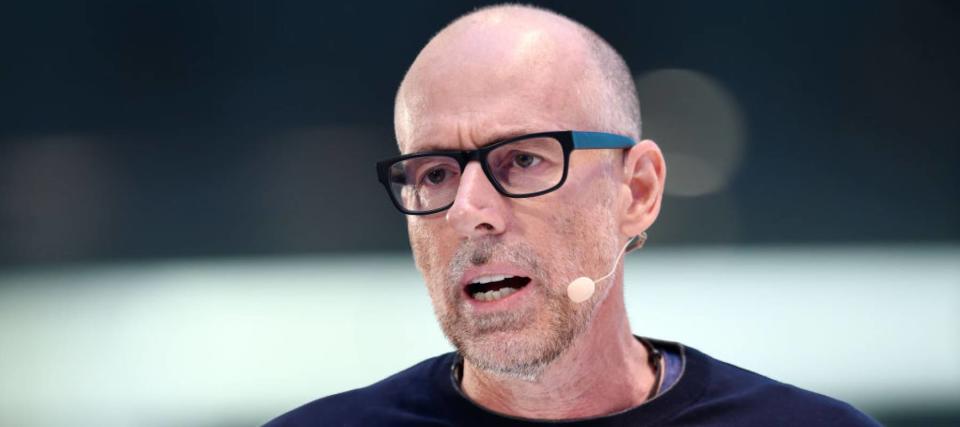'You should never be at home': This 58-year-old NYU professor went viral for telling young folks that they need to be out of the house for success — but his advice was blasted

Professor Scott Galloway of New York University is used to being the man who calls out the dinosaurs and pushes for new ways of thinking.
Don't miss
Rich young Americans have lost confidence in the stock market — and are betting on these 3 assets instead. Get in now for strong long-term tailwinds
'Hold onto your money': Jeff Bezos says you might want to rethink buying a 'new automobile, refrigerator, or whatever' — here are 3 better recession-proof buys
This janitor in Vermont built an $8M fortune without anyone around him knowing. Here are the 2 simple techniques that made Ronald Read rich — and can do the same for you
But when Galloway spoke recently at the Wall Street Journal's CEO Council Summit, he sounded downright Jurassic when he said of remote work: “You should never be at home. That’s what I always tell young people. Home is for seven hours of sleep and that’s it … You need to be out of the house.”
As if the pandemic never happened, right?
Galloway, who teaches marketing and co-hosts the popular Pivot podcast, believes the amount of time spent at home is inversely correlated with “success professionally and romantically.” Yet his recent comments, since going viral, have reignited the debate over remote work, its social impact and whether older generations (Galloway is 58) are out of touch with the challenges and choices of Gen Z.
The Galloway fallout
To be certain, Galloway has some fair points. Relationships are the currency of a successful career, according to the professor’s comments on his podcast and media appearances. He’s also expressed concerns about the rise in loneliness and decline in mental health for young people.
Yet mental decline can be just as attributable to stress from micromanagement in the office, for example. Meanwhile, Professor Galloway’s comments went viral on TikTok. Younger users on the platform pushed back on the professor’s comments, focusing on the economic climate and costs associated with commuting.
“This is total BS,” said one user. “Hustle culture with a sprinkle of consumerism.” Other comments discussed the high cost of rent and shelter to justify staying at home or the expenses associated with traveling and eating while going into the office. “You step out of the house and spend $100,” said one user.
The cost of housing was another key factor for many in the comments section. “If I’m paying more than a quarter [of] monthly rent, I’m enjoying my space,” one said. All this moved BuzzFeed staff writer Krista Torres to observe, “I have never seen Gen Z and millennials come together so heated.”
Others pointed out that online dating meant workers didn’t need to get out to find relationships and that the proximity to family and pets was better for happiness and life satisfaction, even if it dragged their careers.
Read more: Shopping without a cash back credit card is just losing money — here's how to make sure you don’t miss out on serious savings
Is remote work here to stay?
Despite the push back from younger workers, older business leaders seem keen on getting workers back into the office. JP Morgan, Citibank and Goldman Sachs have all called employees back to work in recent months, while even tech companies like Snap and Tesla have clamped down on remote work.
Tesla CEO Elon Musk went as far as to call remote work “morally wrong,” though Musk offered no factual evidence to back up that assertion.
More than half (58%) of Americans work from home at least once per week, according to research by McKinsey. By 2025, 36.2 million Americans may be clocking in from the comfort of their home, says Upwork.
Workers report feeling happier, more satisfied and more productive while working from home. However, one study found that remote employees may have slower career progression because they were less likely to receive feedback. The paper was put together by economists from Harvard, the Federal Reserve Bank of New York and the University of Iowa last month.
To balance outcomes, research from Stanford University suggests a hybrid work environment. Coming into the office a few days a week while working from home the rest of the time could help employees make relationships and advance their career without having to give up the flexibility of remote work.
Remote logic
Galloway, for all his renown, clings to a definition of financial success that seems to embrace the maxim of “gain the world and lose your soul.” Here’s another quote from his talk: “If you expect to be in the top 10% economically, much less the top 1%, buck up. Two decades plus of nothing but work. That’s my experience.”
This assumes that workaholism and related mental health issues don’t run rampant in Western society, or that close relationships should play second or third fiddle to building a fortune.
But, for many workers these days, there are other ways to define what is most valuable.
What to read next
You could be the landlord of Walmart, Whole Foods and CVS (and collect fat grocery store-anchored income on a quarterly basis)
Here's how much money the average middle-class American household makes — how do you stack up?
What do Ashton Kutcher and a Nobel Prize-winning economist have in common? An investing app that turns spare change into a diversified portfolio
This article provides information only and should not be construed as advice. It is provided without warranty of any kind.

 Yahoo Finance
Yahoo Finance